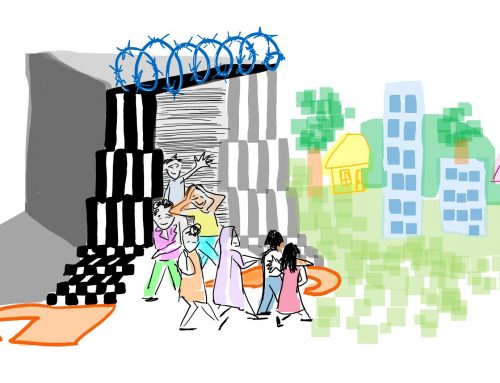Prisons Inspector finds that Yarl’s Wood is failing vulnerable women
12 August 2015
Nick Hardwick, the HM Chief Inspector of Prisons, has today found that Yarl’s Wood Immigration Removal Centre ‘is failing to meet the needs of the most vulnerable women.’
For the first time, the government-appointed inspector has joined calls from a parliamentary inquiry and the Detention Forum for a time limit on detention. He recommends that ‘a strict time limit must now be introduced on the length of time that anyone can be administratively detained.’
Hardwick was ‘particularly concerned about the length of time some women were detained and the detention of the most vulnerable women without clear reason.’ He noted that in the previous six months, ‘more than double the number of women who were removed (443) were released back into the community (894), which raises questions about the validity of their detention in the first place.’
At the time of the inspection, 19 women had been held for over six months, and one for 17 months.
The Inspector called for pregnant women and those with serious mental health problems only to be detained ‘in the most exceptional circumstances.’
Hardwick concluded that ‘the main concerns we had in 2013 had not been resolved and there was greater evidence of the distress caused to vulnerable women by their detention.’
Eiri Ohtani of Detention Forum said:
‘This is yet another sad report about one of the saddest places in the UK. The financial and human costs of immigration detention are simply too high, and we cannot afford to go on like this. It is time for the government to start engaging with the detention reform agenda proposed by the parliamentary inquiry panel. It should introduce a time limit of detention of 28 days and develop community-based alternatives to detention to reduce both the financial and human costs of detention.’
Lisa Matthews of Right to Remain said:
‘The concerns raised in HM Inspecorate’s report on Yarl’s Wood are sadly not surprising. Right to Remain believes that these major failings are endemic to a system that deprives people of their liberty solely for being a migrant, a system that is intended to stop people establishing their legal right to stay and to drive people to despair, in order that they leave the UK. The regular and growing protests outside detention centres, most recently at Yarl’s Wood on 8 August, show that communities will not stand for migrants being locked up solely for the bureaucratic convenience of the state. The government needs to listen to those who have experienced detention first-hand (detained indefinitely, without trial) and to the many people from all walks of life calling for an end to this harmful and unjust practice.’
Ali McGinley of AVID said:
‘This report is an explicit call for change, and provides a strong evidence base of the harm caused to vulnerable women by indefinite detention. The current safeguards to protect the vulnerable have, once again, been found inadequate, leaving those with a history of rape, abuse or sexual violence at risk of harm. Today’s report echoes the growing call for a time limit on immigration detention, and we hope it encourages the government to take seriously the evidence that detention is harmful. There is no need to detain vulnerable women when their cases can be considered fairly in the community – where they can access the supports they so desperately need.’
Jerome Phelps of Detention Action said:
‘This is another scathing indictment of the indefinite detention of vulnerable migrants. Yarl’s Wood is failing vulnerable women, and detention without time limit is simply failing as a policy. The Inspector has joined the parliamentary inquiry in finding that too many people are being detained unnecessarily for too long. It is high time for the Government to step away from the routine detention of migrants, and instead to work with them to resolve their immigration cases in the community wherever possible.’
Maurice Wren of Refugee Council said;
The fact that people fleeing war and persecution are being locked away indefinitely in a civilised country is an affront to the values of liberty and compassion that we proudly regard as the cornerstones of our democracy
“If the Government wants to prove it’s serious about justice and protecting vulnerable people, Ministers must urgently acknowledge that Britain’s policy of arbitrarily placing people behind bars because it’s politically convenient is wholly unjust, extremely expensive and utterly unsustainable.
“It’s high time Yarl’s Wood and places like it were closed. Seeking asylum is a human right, not a crime.”
=====================================================================
Background
- Yarl’s Wood Immigration Removal Centre is one of 10 centres which make up the UK’s detention estate. In total they hold nearly 4,000 people. Last year, 30,902 people were detained, the highest level ever[1]. Yarl’s Wood was holding 354 women at the time of the inspection. It is run by a private security company, Serco.
- Those who are refused asylum or other immigration status, over-stayers and non-British ex-prisoners are subject to indefinite detention in the UK.
- Although the Home Office maintains that detention is used only for the shortest period of time as a last resort to effect removals and deportations, the UK routinely detains migrants for extreme long-term periods. The UK is the only country in Europe with no time limit on immigration detention. At the end of March 2015, 153 people had been in detention for longer than a year. Many are ultimately released from detention. During the first quarter of 2015, of the total of 7,516 people leaving detention, only 3,376 were removed from the UK. The rest (3,756 people, 50% of those leaving detention) returned to their community after detention, raising the question of why they were detained in the first place.
- The cross-party parliamentary inquiry into the use of immigration detention[2] concluded that the UK detains far too many people for far too long and recommended that the UK introduce a 28 day time limit on immigration detention. The government is yet to respond fully to this report and there is a parliamentary debate on it on 10 September 2015.
- In the meantime, the government has stated on a number occasions that they will review the conditions in which vulnerable individuals are detained. The inquiry panel has pointed out that the Shaw Review[3] explicitly excludes examination of the decisions to detain, thus it is unable to address the key issues highlighted by the detention inquiry.
- Recently, the UN Human Rights Committee, a body of 18 international experts who monitor the implementation of the international covenant on civil and political rights, made its first review of Britain since 2008. In their report, the Committee said it ‘is concerned that no fixed time limit on the duration of detention in Immigration Removal Centres has been established and that individuals may be detained for prolonged periods.’
- In recent years, the UK’s detention practiced has been mired with a raft of high profile scandals including allegations of sexual abuse at Yarl’s Wood, the death of a frail 84 year old Canadian man with dementia in handcuffs, and a proliferation of human rights breaches where the detention of no less than six mentally ill detainees has been found by the High Court to constitute cruel, inhuman and degrading treatment.
- Until July 2015, women asylum-seekers were held at Yarl’s Wood for the Detained Fast Track asylum process, in which their claims were processed in detention to accelerated timescales. On 29 July 2015, in a case brought by Detention Action, the Court of Appeal found the Fast Track to be ‘systemically unjust’, and upheld the decision of the High Court to quash the judicial rules governing the appeals process. This followed four rulings over the previous year that aspects of the Fast Track were systemically unlawful. As a result, the Minister for Immigration announced to Parliament in July 2015 the suspension of the DFT. However, he made clear that the Government intends to reintroduce the process following a review.
[1] Immigration Statistics, January to March 2015 https://www.gov.uk/government/statistics/immigration-statistics-january-to-march-2015
[2] The Inquiry was jointly hosted by APPG on Refugees and APPG on Migration. http://detentioninquiry.com/
[3] On 18th March, James Brokenshire stated in Parliament that there were no plans to review the ‘use of detention overall’ and referred to the Shaw Review. https://www.gov.uk/government/uploads/system/uploads/attachment_data/file/402206/welfare_in_detention_review_tors.pdf




